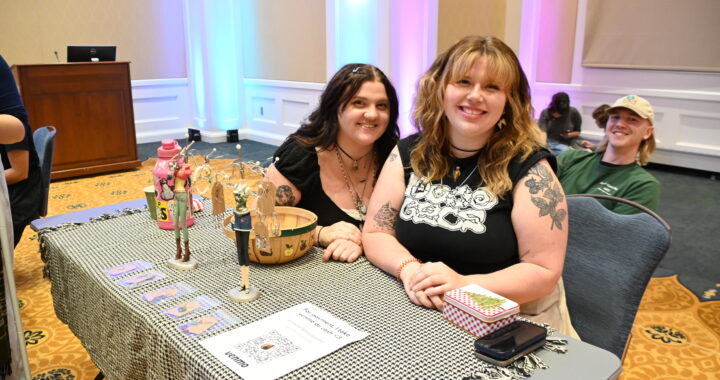UMW Data Mavens host EagleFest hackathon contest
3 min read
Allison Schumacher | The Blue & Gray Press
By ALLISON SCHUMACHER
Staff Writer
EagleFest is a 36-hour hackathon, occurring Nov. 2 to Nov. 4, that is held by the UMW Data Mavens club and is sponsored by AECOM. AECOM is an architectural, engineering, construction, operations, and management company based out of Los Angeles.
Data Mavens’ mission is to help UMW students gain knowledge about data science, be inspired by data science, and responsibly apply data science, which are also the goals of EagleFest.
“It is a contest,” said Greg Phillips, UMW alumnus, and AECOM representative. “The objective is to find the most meaning in the data. And then you take that data, and you try to turn it into something meaningful that you can explain to somebody. As opposed to being, like, random information that you can put into charts, graphs. Try to find meaning in it that people can actually put to use [sic].”
This year, the teams at EagleFest will use health science data. The teams are typically comprised of three people, sometimes two. “We’ll offer people who don’t have teams an opportunity to team up with some other teams,” said Harrison Crosse, the president of Data Mavens and a senior computer science major who also is minoring in data science.
The teams will then be judged by a panel of six or seven judges, including Phillips, Dr. Stephen Davies, associate professor of computer science, and Dr. Chris Garcia, associate professor of business. When asked what he was looking for in the analyses, Phillips said, “I wouldn’t say we’re looking for anything in particular, per se. That kind of is the big question. I look at things through my frame of reference. That’s just me. It makes sense for me to open it up to other people, with different ways of looking at things, because, I can’t know what I don’t know.”
Phillips further explained the process.
“And then they’ll present their analysis and award points based on how creative it was, how meaningful it was, the amount of insight they found in it, how well they communicated it, how well they presented it. Then the judges will narrow it down to three teams, and those three teams can either place first, second, and third, and get a trophy, whatnot. Overall, the grand prize, whoever did the best, the wow factor announced [sic], I’ll fly them down to Tampa this year and the big leaders will meet and take their analysis and presentation and present it to those guys,” said Phillips.
While UMW is the only university that hosts EagleFest, there are similar contests at other universities. “It came to us because [Greg Phillips] is a former alum,” Harrison Crosse, the president of Data Mavens, explained. The American Statistical Organization sponsored DataFest, which has hackathons with all different universities, such as UCLA, Purdue University, Penn State, UNC, NC State, Duke, and Virginia Tech.
“Data Mavens actually went to Penn State last year to compete in that competition, with other people from around this area. We are using EagleFest [this year] as a primer as opposed to going into it unknown. [Last year] was the first time any of us ever went to a DataFest, so we were a little unprepared.” Data Mavens will attend a DataFest event in the spring.
While other teams from other universities participate in DataFest, EagleFest is only open to UMW students. “It was discussed, [but by the time we got the green light], we didn’t have enough time to advertise,” Phillips, the representative from AECOM, said. “It’s just UMW, but next year, we’ll look into advertising it to Old Dominion University, Christopher Newport University, and other colleges in the area.”
EagleFest has given students, especially those majoring in data science, statistics, computer science or math, hands-on experience that they can use in their future careers. It gives them an opportunity to practice their communication skills, including explaining the meaning of a data set to someone who may not necessarily know anything about that particular data set. They also get to develop presentations and show them to panels of judges, which is good practice for their future workplaces.


